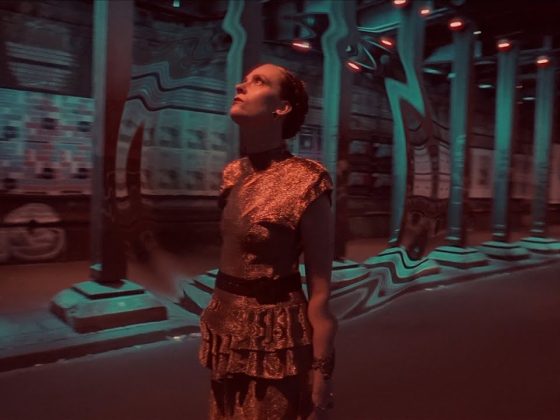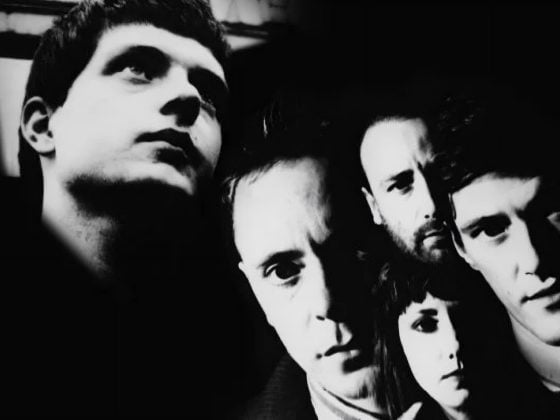The two travellers sit motionless in the empty compartment as the silver neurotrain glides silently through electronic space. Blue and white lights blink slowly in the blackness outside the window, signalling the action of digital transmogrification. The process is instantaneous yet interminable. Their journey is about to begin…
Nümonia began not with instruments but with images: an unfinished student film, conceived by video artist Ani Kalemkerian and scored by Jon Asencio, left to gather dust for thirty years. What began as a stark sci-fi allegory – two inter-dimensional travellers arriving to avert planetary collapse – was left in limbo. Kalemkerian relocated to Vancouver, Asencio stayed in Montreal, and silence settled. Then, in 2022, by the peculiar mechanics of fate and geography, the two collided once more. This time, the film gave way to a band.
Kalemkerian, with no formal musical background but a striking presence, took to the microphone, while Asencio (formerly of Doughboys and Pest 5000) manned the machinery. The Age of Nümonia, their debut LP, released by Le Backstore Records, unspools like a cold war broadcast from a future that never arrived: minimal, mechanical, and rooted in a love for pulp paperbacks, synth decay, and the odd angles of experimental film. A message, decades delayed. The album is full of Kraftwerk’s blueprint by way of pure No Wave, its droll chanting bringing to mind the Flying Lizards, Delta 5, Cristina and Lydia Lunch.
With its sultry drum machine beats, pulsing bass synths, and ghostly bell-like keyboard melodies, Electronic World plunges into a digital dystopia where control is but an illusion, and power flickers like glitching code. Set against a radiant grid of games and bleak outcomes, the speaker emerges as a master manipulator—part sorcerer, part sadist. The stakes are ruthless, the rules unforgivingly binary, and the players are mere marionettes in this dark theater. Here, victory equates to survival, yet no one escapes the circuitry unscathed. The true entrapment lies in the intoxicating thrill of the game.
Beneath the shimmering surface of a mechanized Krautrock synth reverie, where synths pulse like pistons, a spectral figure emerges in the neon glow. The girl in “Body of Glass” drifts through a landscape of disconnection and longing. Fragile yet fierce, she gazes at the world from behind her translucent barrier; untouched, unnamed, and unclaimed. The lyrics weave a tapestry of techno-poetry and late-night desire, transforming detachment into a bold declaration. Flesh blurs into fiction, form becomes fluid. She is indeed a body, but one fashioned from glass, gas, grass, and something wonderfully crass.
“Hypnotic” is a mesmerizing journey draped in cosmic synths, whose melody conjures visions of a foreboding robotic companion gliding through the vastness of space. Lyrically, it pulls down a veil of enchantment, desire, and the perilous edges of surrender. The mage upon the stage transcends mere illusion—his gaze ignites a shadowy allure that captivates the soul. As seduction intertwines with sorcery, the observer transforms into the observed, willingly relinquishing control. Pocket watches sway rhythmically, thoughts dissipate like wisps of smoke, and identities blur into the ether. This is enchantment laced with peril, a tightening trance that ensnares the senses. Love, power, and possession are murmured like a countdown, evoking a haunting refrain—an escape forever elusive.
We then delve into pure whimsical absurdity with the catchy “na-na-nas” of “Beach Wave,” which has a playful, sing-song quality reminiscent of a playground song set in outer space. It evokes the feeling of an excursion to an interplanetary tropical paradise, as if Nouvelle Vague had commandeered a spaceship to enjoy Mai Tais on an alien beach.
Dark Romance, with its funky batcave bass and witchy synths, slinks through gothic kitsch and baroque desire with the drama dial snapped off. It’s a danse macabre draped in lace and lit by lightning, where blood becomes courtship and candelabras cast long, decadent shadows. Fantasy unravels into obsession, and sanity dissolves into satin-lined delirium. The masquerade grows more surreal, more seductive. It’s cold hands, hot breath, and a vampire danceathon to the death.
With its buzzing avant-garde barrage of buzzing synths and drum beats, Bobby Hates Jazz unfurls stone-faced French lyrics, resulting in a melange of quirky sounds that bounce between dada absurdity and deadpan defiance, spinning a litany of loathings with tongue firmly in cheek. Bobby despises flying oranges, talking balloons, and the tyranny of umbrellas, but adores strolling cats and dancing without pause. It’s a portrait of peculiar preferences painted in bold, surreal strokes. Then comes the punchline: a gleeful, mantra-like breakdown declaring jazz the ultimate offence. Joyfully jarring, delightfully disjointed…Bobby’s world is bizarre, and strictly four-four.
Dialing in a dischordany new wave soundtrack that critiques the vanity and dissonance of the 80s, “Plastic Surgery” feels like a funky synthpop spell resurrected from a WaxTrax! compilation cassette. The vocals, infused with a sarcastic sneer reminiscent of Malaria!, express a desire to be examined, perfected, and showcased. It’s satire infused with silicone—where beauty is branded, sculpted, and sold. Imagine Venus meeting vinyl and Marilyn encountering a mannequin. The chorus echoes its cursed mantra to the mirror, asking not who you are, but who you could become—if you were cut, stretched, and made to shine.
The title track, The Age of Nümonia, unfolds with intention, echoing the essence of a mutant no-wave synth-pop anthem, set against the relentless rhythm of a train racing down the tracks, with bells tolling softly in the distance. This piece weaves together art-pop grooves with an acerbic vocal manifesto, delivering a chilling litany of decay with a commanding sense of urgency. The lyrics paint a portrait of a world unraveling, where vanity, violence, and voyeurism reign supreme. In this landscape, autocracy and hysteria usurp empathy and reason. Amidst the shatter of glass and the blooms of underpass flora, a haunting question lingers in the mirror. This is an age that bears a name: Nümonia—a wordless cry, a diagnosis of the sickness of modernity, wrapped in a shroud of repetition and ruin.
Listen to The Age of Nümonia below and order it here. Canadians can order it here.
Nümonia will have a record release party on April 5th in Montreal, the first performance with a 6 piece band.
Follow Nümonia:

















 Or via:
Or via: